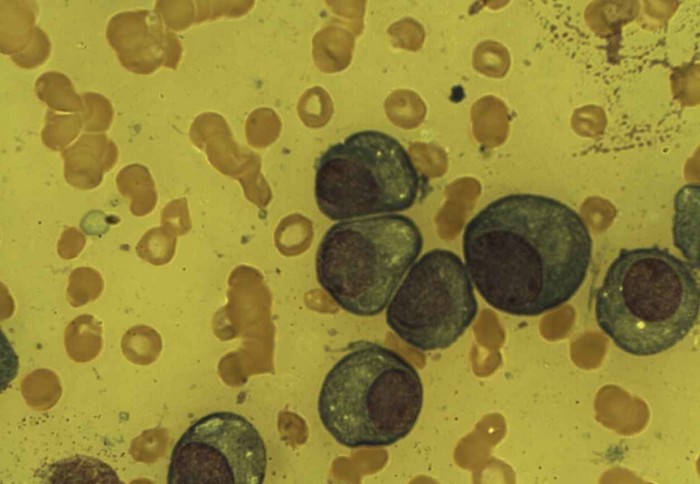New anti-cancer drug combo treatment shows promise for myeloma patients

Multiple myeloma is a blood cancer that develops from plasma cells, pictured here
Phase 3 trial results reveal that selinexor – a relatively new anti-cancer drug – improves patient outcomes when combined with established treatments.
A weekly regimen of selinexor in combination with bortezomib and dexamethasone reduces the risk of disease progression or death by 30 per cent in patients with multiple myeloma, according to findings published today in The Lancet.
Multiple myeloma, also known as myeloma, is a blood cancer that develops from plasma cells. From 1990 to 2016, myeloma incidence grew globally by 126 per cent, with deaths increasing by 94 per cent in the same period. Despite significant progress in research and improved treatment options over the past 20 years, it remains incurable.
Evaluating a new approach
Previous trials have suggested that combining three anti-cancer drugs can offer improved outcomes for myeloma patients compared to a standard two-drug regimen. However, these ‘triplet combinations’ can require frequent and long visits to the hospital, creating an additional burden for patients and healthcare providers and often leading to more side effects.
Following promising results from phase 1 and 2 trials, the BOSTON study team set out to evaluate the clinical benefits of once-weekly dosing of the drug bortezomib in combination with selinexor and dexamethasone, versus a twice-weekly regimen of bortezomib and dexamethasone.
Sponsored by the US pharmaceutical company Karyopharm Therapeutics, the BOSTON study was carried out across 123 sites in 21 countries. 402 eligible myeloma patients were recruited to the trial and randomly assigned a course of treatment, with 195 (49 per cent) receiving the three-drug combination and 207 (51 per cent) following the standard-two drug regimen.
Improving outcomes and quality of life
According to the findings, the once-weekly combination reduced the risk of disease progression or death by 30 per cent and was shown to be consistently effective across various patient subgroups.
In addition, this approach used 40 per cent less bortezomib and 25 per cent less dexamethasone during the first 24 weeks of treatment. Clinic visits were also reduced by around 37 per cent compared to the standard bortezomib and dexamethasone regimen and other commonly used triplet regimens containing bortezomib and dexamethasone.
The study also found that the triplet combination lowered the frequency and severity of peripheral neuropathy, a type of nerve damage that can cause pain, numbness or weakness, which can be caused or exacerbated by certain myeloma treatments.
The future of myeloma treatment
Commenting on the significance of the findings, Dr Holger Auner, UK Chief Investigator for the trial, said: “The study further confirms that selinexor is a very promising anti-cancer drug. While a number of ongoing studies are investigating how to best use it in different types of cancer, these results pave the way for applications to regulatory bodies to approve and fund the drug combination in multiple myeloma. It is important to note that it may take a while before this treatment becomes widely available to patients in the NHS.”
“This is an exciting study outcome that offers a bit more hope for the future of myeloma treatment. We are delighted that we have had the opportunity to offer the study to a number of our patients, and we're immensely grateful for the support of Imperial College Healthcare NHS Trust and the NIHR Imperial Biomedical Research Centre in carrying out this trial. I also want to thank the wonderful team of the Haematology Clinical Trials Unit for their exceptionally professional commitment and dedication at all times!”
Dr Sharon Shacham, President and Chief Scientific Officer of Karyopharm Therapeutics, added: “We believe the successful outcome of this study represents an important advancement for myeloma patients and we are sincerely grateful to all of the patients and investigators who participated in the BOSTON study.”
‘Once-weekly selinexor, bortezomib, and dexamethasone versus twice-weekly bortezomib and dexamethasone in patients with multiple myeloma (BOSTON): a randomised, open-label, phase 3 trial’ by Sebastian Grosicki et al. is published in The Lancet
Image credit: Dr Osaro Erhabor
Article supporters
Article text (excluding photos or graphics) © Imperial College London.
Photos and graphics subject to third party copyright used with permission or © Imperial College London.
Reporter
Ms Genevieve Timmins
Academic Services